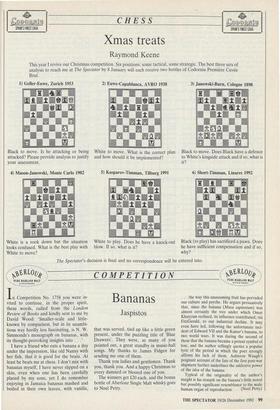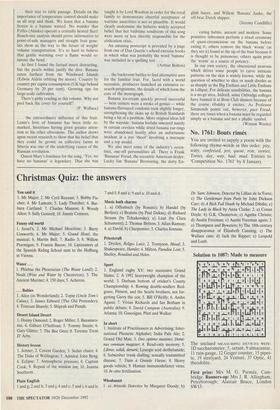COMPETITION
Bananas
Jaspistos
In Competition No. 1758 you were in- vited to continue, in the proper spirit, these words, culled from the London Review of Books and kindly sent to me by David Wood: 'Smaller-scale and little- known by comparison, but in its unambi- tious way hardly less fascinating, is N. W. Simmonds's monograph on bananas, with its thought-provoking insights into . . .'
I have a friend who eats a banana a day under the impression, like old Nanny with her fish, that it is good for the brain. At least he beats me at chess. I don't mix with bananas myself, I have never slipped on a skin, even when one has been carefully placed by my sons; yet I do remember enjoying in Jamaica bananas mashed and boiled in their own leaves, with vanilla, that was served, tied up like a little green present, under the puzzling title of 'Blue Drawers'. They were, as many of you pointed out, a great standby in music-hall songs. My thanks to James Fidgen for sending me one of them.
Thank you ladies and gentlemen. Thank you, thank you. And a happy Christmas to every damned or blessed one of you.
The winners get £20 each, and the bonus bottle of Aberlour Single Malt whisky goes to Noel Petty. . . . the way this unassuming fruit has pervaded our culture and psyche. He argues persuasively that, since the banana (Musa sapientum) was almost certainly the tree under which Omar Khayyam reclined, its influence contributed, via FitzGerald, to our industrial decline. It may even have led, following the unfortunate inci- dent of Edward VII and the Kaiser's banana, to two world wars. It was during the second of these that the banana became a potent symbol of loss, and the author tellingly quotes a popular lyric of the period in which the poet strongly affirms his lack of them. Auberon Waugh's poignant account of the fate of the first post-war shipment further underlines the addictive power of the idea of the banana.
Typical of the originality of the author's insight is his remark on the banana's little noted but possibly significant resemblance to the male human organ of reproduction. (Noel Petty) • . . their tree to table passage. Details on the importance of temperature control should make us all stop and think. We learn that a banana frozen is a banana wasted. No wonder that Fyffes (Alaska) operate a centrally heated fleet! Bunch-size analysis should prove informative to point-of-sale managers and straight fruit gene- tics show us the way to the future of weight/ volume transportation. It's so hard to believe that gentle warming over a flame would re- instate the bend.
At first I found the factual insets distracting, but the pearls within justify the dive. Banana eaten furthest from the Windward Islands (Edwin Aldrin orbiting the moon). Country by country per capita consumption (UK lags behind Germany by 20 per cent). Growing tips for large-scale cultivation.
There's pithy reading in this volume. Why not peel back the cover for yourself?
(P. Wallace) . . . the extraordinary influence of this fruit. Lenin's love of bananas has been little re- marked, historians having given greater atten- tion to his other obsessions. The author draws upon recent research to show that his belief that they could be grown on collective farms in Siberia was one of the underlying causes of the Russian revolution.
Queen Mary's fondness for the song, 'Yes, we have no bananas' is legendary. That she was taught it by Lord Woolton in order for the royal family to demonstrate cheerful acceptance of wartime austerities is not so plausible. It would clearly undermine the hitherto widely accepted belief that her bathtime renditions of this song were more or less directly responsible for the abdication crisis.
An amusing postscript is provided by a page from one of Dan Quayle's school exercise books in which what was probably the word 'banana' was included in a spelling test . . .
(Arthur Bolton) . . . the backroom battles to find alternative uses for the familiar fruit. For, faced with a world recession, producers launched an extensive re- search programme, the details of which form the core of the monograph.
Banana ice-cream quickly proved successful - bent comets were a stroke of genius - while banana-flavoured condoms took slightly longer, strengthening the skins up to British Standards being a bit of a problem. More original ideas fell by the wayside: banana loofahs smeared nastily in certain crevices while dried banana ear-rings were abandoned hastily after an unfortunate incident at a zoo 'shoot' involving a macaque and a top model.
We also meet some of the industry's eccen- trics, one-off personalities all. There is Frank 'Bananas' Freud, the eccentric American dealer, Lucky Jim 'Banana' Brownring, the dotty En-
glish buyer, and Willem 'Banana' Janke, the off-beat Dutch shipper.
(Jeremy Condliffe) . . . eating habits, ancient and modern. Some primitive tribesmen perform a ritual ceremony of quasi-circumcision on the banana before eating it; others remove the black 'worm' (as they see it) found at the tip of the fruit because it is thought to be poisonous; others again prize the 'worm' as a source of potency.
In our own society, the obsessional neurosis which drives some people to carve intricate patterns on the skin is widely known, while the question of whether to slice or mash divides us as sharply as the Big Endians and Little Endians in Lilliput. For delicate sensibilities, the banana is a no-go area. Indeed, some Oxbridge colleges have banned it at Boat Club dinners because of the coarse ribaldry it excites. As Professor Simmonds points out, however, pace Freud, there are times when a banana must be regarded simply as a banana and not a phallic symbol.
(Watson Weeks)
No. 1761: Bouts times
You are invited to supply a poem with the following rhyme-words in this order: pity, witty, confessed, jest, quote, rote, stories, Tories, day, way, had, mad. Entries to 'Competition No. 1761' by 8 January.











































































































 Previous page
Previous page